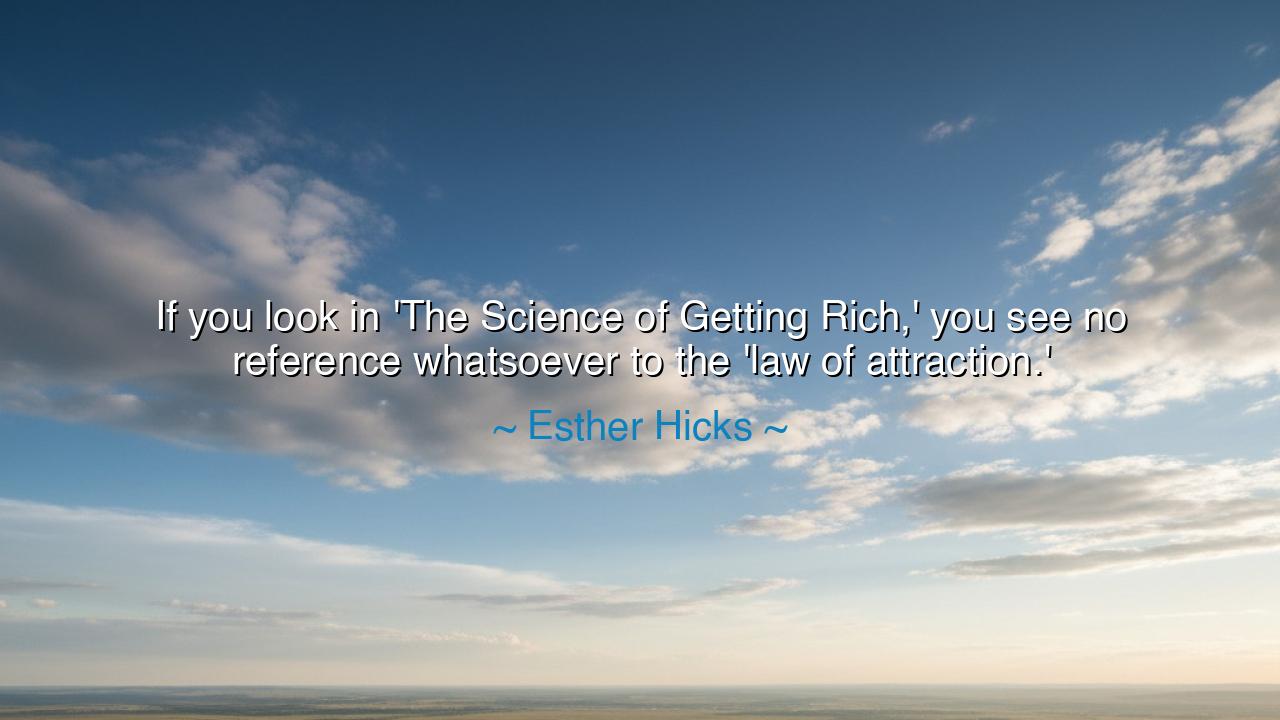
If you look in 'The Science of Getting Rich,' you see no
If you look in 'The Science of Getting Rich,' you see no reference whatsoever to the 'law of attraction.'






Hear me now, O Seekers of Wisdom and Truth, for the words of Esther Hicks bring forth a deep lesson regarding the pursuit of wealth and fulfillment: "If you look in 'The Science of Getting Rich,' you see no reference whatsoever to the 'law of attraction.'" At first glance, these words may seem simple, yet they contain a truth that transcends time and belief. In them, we are reminded that the path to prosperity is not always aligned with popular ideologies, nor is it bound by the catchphrases of the day. True wealth and fulfillment are not gained by blindly adhering to every fashionable belief, but through deeper understanding and focused action.
Let us turn, O Children of the Earth, to the origins of 'The Science of Getting Rich', a work of profound influence written by Wallace D. Wattles in 1910. In this book, Wattles does not speak of the law of attraction as it is commonly understood today, but rather of the laws of thought and the importance of intention. He teaches that one must not merely wish for riches, but must act in a manner that aligns with the principles of creativity and productive effort. It is not enough to think positively or to believe that wealth will somehow appear from the ether—no, true prosperity comes from understanding the fundamental laws of nature, and how those laws work in the material world.
In ancient times, O Seekers, there was Aristotle, that great philosopher who sought to understand the nature of virtue and the path to a good life. He taught that true happiness and success came not from mere wishful thinking or the accumulation of wealth, but through the cultivation of character and the practice of virtue. Much like Wattles, Aristotle understood that to achieve greatness in any realm, one must focus not on superficial beliefs, but on a deeper alignment with the forces that shape the world. Aristotle’s teachings, though centuries old, resonate with the wisdom that Wattles imparted—that one must act with purpose and integrity, not simply wait for fortune to manifest.
Consider, too, the story of Benjamin Franklin, that great polymath of the 18th century who understood, perhaps better than most, the relationship between action and success. Franklin, a founding father of the United States, did not rely on mystical forces to achieve his goals; instead, he adhered to principles of hard work, discipline, and learning. His famous saying, "Early to bed and early to rise makes a man healthy, wealthy, and wise," speaks to the very essence of Wattles' teachings—that success is rooted in thoughtful, deliberate action rather than idle wishing or waiting. Franklin’s life was a living testament to the idea that wealth and riches come not from an abstract belief, but from a well-organized and consistent effort.
Now, let us not misinterpret Hicks’ words as a dismissal of the power of thought and belief. Rather, she cautions us to understand that the law of attraction is not a substitute for the law of action. The world is not governed by mere desires; it is shaped by the work that we put into it. Action, when coupled with purpose and clarity, is the true engine of creation. A man who sits and merely wishes for riches, thinking that the universe will align itself to fulfill his desires, will find that his hopes remain unfulfilled. But the man who seeks knowledge, who works diligently, and who aligns his thoughts with action, will see his world shift in profound ways.
The lesson, O Children, is clear. If you wish to create true prosperity, focus not merely on the intangible forces of the universe but on the tangible laws that govern life. Thought is the beginning of creation, yes—but it must be followed by action, persistence, and dedication. You cannot sit idly by, hoping that the universe will bring you wealth, health, or success. Action is the fire that ignites the fuel of thought and belief. Only through consistent effort and a deep understanding of principles can you hope to achieve your dreams.
Let us then take up the mantle of purposeful action. Set your sights on your goals, but understand that true success requires more than wishful thinking. It requires discipline, learning, and a relentless pursuit of your purpose. In every endeavor, remember that action must always follow thought. Let the words of Esther Hicks and Wallace D. Wattles guide you, not to idle dreams, but to a life lived in harmony with the great laws of nature—where thought and action align, creating the path to the success you seek.






AAdministratorAdministrator
Welcome, honored guests. Please leave a comment, we will respond soon